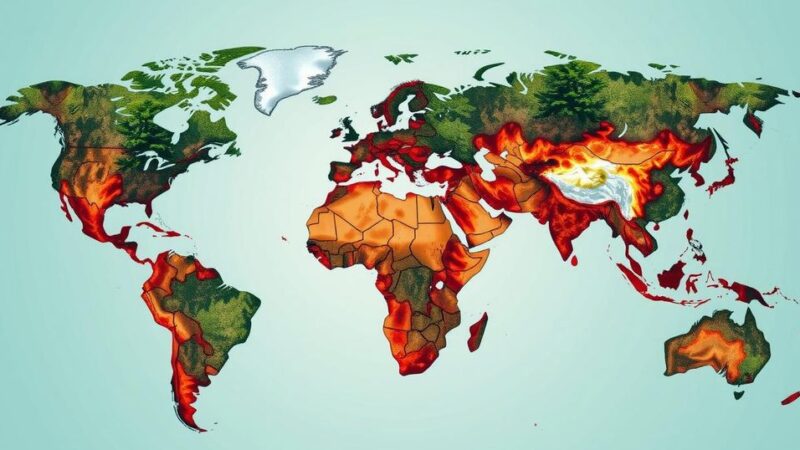The year 2024 saw record global temperatures, exceeding the 1.5°C threshold, leading to extreme weather and significant humanitarian crises. Wildfires, floods, and drought impacted millions and caused over $550 billion in damage. Immediate action is needed for climate adaptation and resilience, particularly for vulnerable populations. The article emphasizes the role of industries, particularly fashion, in driving change, alongside the urgent call for equitable climate policies.
The year 2024 marked a critical moment in the climate crisis as the planet experienced its highest recorded temperatures, fundamentally altering the landscape of global weather patterns. This surge in temperatures led to catastrophic extreme weather events, affecting the lives and livelihoods of millions worldwide. Data has revealed that for the first time in history, global average temperatures have surpassed the crucial 1.5°C threshold above pre-industrial levels. Although this breach occurs within the understanding of the Paris Agreement, it serves as a stark signal of the rapidly escalating climate emergency, necessitating urgent transformative action.
The consequences of these extreme temperatures manifested in a series of devastating events, including severe droughts, wildfires, and destructive storms, which resulted in the loss of thousands of lives and the displacement of millions globally. The onset of 2025 saw destructive wildfires in Los Angeles that forced approximately 150,000 residents to evacuate and resulted in at least 24 fatalities. These wildfires, unmatched by their intensity and timing, are indicative of a new era characterized by complex climate-related disasters, driven by compounding environmental conditions brought about by a warming climate.
The crisis extends far beyond Los Angeles; wildfires in Spain, Brazil, and Canada, alongside catastrophic flooding in Africa, underscore the worldwide implications of climate change. In 2024, alarming statistics revealed that water-related disasters claimed over 8,700 lives and displaced 40 million people, while economic damages surpassed $550 billion. Numerous countries, including Nepal and Brazil, encountered lethal flooding, and droughts in southern Africa significantly impaired crop production, endangering the food security of 30 million individuals.
In light of this escalating threat, the necessity for immediate global action has never been clearer. According to the 2022 IPCC report, although climate change indiscriminately impacts all regions, the degree of vulnerability varies through facets such as inequity and governance. Therefore, it is essential that climate action emphasizes equity, inclusivity, and resilience alongside emissions reduction. Approximately 3.3 to 3.6 billion individuals live in areas classified as “highly vulnerable” to climate change, highlighting an urgent need for improved adaptation strategies, supported by necessary funding for loss and damage.
The fashion industry, responsible for up to 4% of global emissions, has a pivotal role to play by prioritizing sustainable practices and promoting equitable policies. By championing legislative action and reducing emissions, this sector can significantly influence climate change trajectories. As articulated by United Nations Secretary-General António Guterres in his 2025 New Year’s address, “We are facing a climate breakdown in real time. We must get off this road to ruin, and we have no time to lose.”
The article addresses the pressing consequences of climate change as reflected in global temperatures and the resulting extreme weather events. With data showing a breach of the 1.5°C threshold, the article emphasizes the urgency for transformative action to address the climate crisis. It highlights the global nature of the threats posed by climate change, including loss of life, displacement, and economic devastation, while also acknowledging the varying levels of vulnerability across populations due to systemic issues. The role of different sectors, such as fashion, in mitigating climate impacts is discussed, alongside necessary policy changes to ensure a sustainable future.
In conclusion, the stark realities of climate change witnessed in 2024 serve as a dire warning of the urgent need for global responsive measures. The unprecedented rise in global temperatures and the consequent extreme weather events have had devastating impacts across the planet. Addressing the root causes of climate change demands immediate action focusing on equity, resilience, and a commitment to sustainable practices across all sectors. The insights shared by global leaders reinforce the critical importance of acting decisively to avert a climate crisis of even greater magnitude.
Original Source: globalfashionagenda.org







